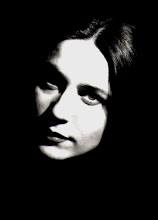A Tin Star and Electric Sunsets

Fragments of people's lives will always live on within me. One thing I'll always remember, is how M. and I met.
It was a dull February evening, back in 1976. It was the week during the Carnevale and, as is usual at that time of year, the weather was gloomy. Low flocks of gray cloud, moist soil and skeleton trees; wet dog turds making the sidewalks slippery. February, cold and devoid of colour but for schools of small children, running about the town's narrow streets in fancy dress. A parade of faries, cowboys and indians, showering anything in sight with hands full of confetti. The psychedelic sprinklings of purple, green and yellow paper landed on the wet pavement and in a matter of days, melted under the drizzling rain.
On such an evening, I left my parent's house for a solitary walk around the block. I remember my overwhelming boredom; the tragedy of growing up in the burbs, which manifested itself in the form of a tightening in my chest and a bittersweet malancholy that brought tears to my eyes, muffling a silent rage. I cursed this town.
There was nowhere special to go to so I walked past the schoolbuilding, the local fire department and down to the carpark in the main square, before heading back home again. I remember the taste of smoke on my toungue, clenching my fists inside my coat pockets and praying for relief from the terrible dread. "Why can't someone interesting walk into my life?"
I had barely finished elaborating that thought, when a tall figure came swinging around the corner and we almost collided. I stopped in my tracks and looked up at the slender frame that was now blocking the sidewalk. He was wearing a navy woolen coat, which reached down to his ankles. He smirked at me. He had a way of smiling that reminded me of a cat that had just finished preening its whiskers. He had a fair complection with ash-coloured flyaway hair, but his eyes were the colour of chocholate. His voice was warm and soothing because he always spoke very slowly. Below his wide smile, something else caught my attention. A five-pointed tin star with the word "Sheriff" engraved in the centre, was pinned to his coat.
I laughed and knew then we were destined to be best friends. The attraction was immediate, mutual, platonic and always unspoken. It didn't last forever but it saw us through our high-school years.
I remember sitting in the club chairs at M's mother's house, sharing a Malbourough, which we'd dipped in some coke. I recall poking the cigarette filter with the tip of my toungue until my whole mouth felt anesthetised. The sour taste of the powder dripping down the back of my throat. I remember him setting up a drum kit in his tiny bedroom. I remember writing poetry and exchanging rhymes, imporovising haikus whenever we'd run into each other in the street. I remember M. walking me to school. I remember the summer of his desertion; him leaving to study art in N.Y.
I met him again twenty years later. I had no trouble recognizing him because he still wore the same kind of coat, cashmere, long and dark and the same wide grin. We had coffee in what had been our favorite café but soon concluded that we had nothing left in common. He had married into a wealthy Parisian family, lived in comfort, a kept man, and painted in his own appartment. This didn't stop him complaining about the hardships of his burgois life-style and the boredom of monogamy. I told him he was just a spoilt baby. He called me a feminist and said so with spite.
But even if my sheriff didn't turn into the wonderboy I had once cherished, I will always preserve the memory of his youth. The image I hold most dear, beside the one of our first meeting, is the one of us walking his Great St. Bernard along the lakefron at dusk. It must have been around November 1980, we stood there in the twilight, admiring the pale sunset, the elctric blue sky, breathing in the crystal clear evening air, when suddenly and noislessly, all the city lights went on. It was what M. declared to be "the Futurist's Electric Sunset".


